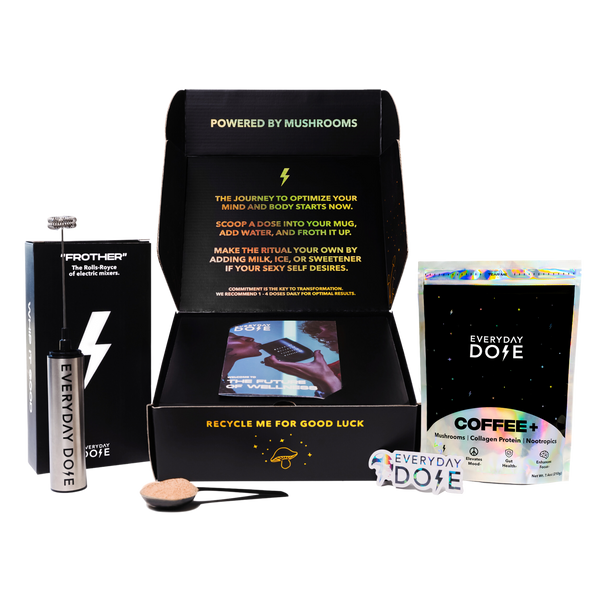Does L-Theanine Help Sleep? Facts and Dosage

We’ve all had nights where sleep seems like a distant dream. Many of us give up after hours of tossing and turning, desperately purchasing any sleep aid that promises relief. Hey, we’re not judging — desperate times call for desperate measures.
In all of your early-morning research on how to get better sleep, you may have stumbled across a supplement called L-theanine. In this article, we’ll unpack what this supplement is, what it does, and what else you can do to get a good night’s sleep.
What Is L-Theanine?
First, let’s get to know this supplement. L-theanine is an amino acid that is not made in the human body. It’s also not technically necessary for our daily functioning, so there’s no need to scramble and make sure you’re getting enough of it every day.
It’d be pretty hard to do that anyway, considering that there’s only one natural source of L-theanine: the Camellia sinensis plant. This plant is used to make green, oolong, white, and black tea. Matcha is a form of green tea that has higher levels of L-theanine because the tea leaves are consumed, not steeped.
L-theanine is widely known for its health benefits, which include antioxidant activity, its ability to support cognitive function and brain function, and its ability to mitigate the effects of caffeine.
When you look for an L-theanine supplement, it’s important to make sure you choose a reputable brand. Otherwise, your supplement could be made of D-theanine, a less helpful form of theanine.
How Can L-Theanine Support Sleep?
L-theanine is often recommended to support sleep quality, and for good reason. Many of the benefits of L-theanine don’t just encourage overall wellness, but they can actually help support sleep from multiple angles. Here are a few ways that L-theanine can encourage a good night’s sleep.
Encourages Alpha Brain Waves
It might seem weird to think about your brain producing waves. However, your body has a whole electrical system, and this system causes the brain to constantly emit waves of electricity.
There are five frequencies of brain waves:
- Gamma: These waves are the shortest and encourage intense concentration and focus.
- Beta: These waves go along with an alert and detail-oriented state of mind.
- Alpha: These waves coincide with a relaxed and peaceful mindset.
- Theta: These waves are produced when we sleep and relax and particularly occur when we are dreaming.
- Delta: These are the slowest brain waves and are generated during meditation and deep sleep.
Brain waves also play a role in sleep. Our brains produce alpha waves as we first fall asleep, which give way to theta and delta waves as we fall deeper into sleep. Alpha waves return when we enter REM sleep. L-theanine can help us go to sleep by supporting alpha brain wave activity.
Supports Mental Health
Mental health can play a major role in our sleep quality. Sleep apnea is more common in people with psychiatric illnesses, and sleep tends to be disturbed in those who struggle with feelings of depression and anxiety.
L-theanine can support the production of dopamine and serotonin in healthy adults. These are special chemicals called neurotransmitters that bind to receptors in the brain and help the brain communicate with the rest of the body. Feelings of anxiety and depression can be related to low levels of dopamine and serotonin, so supporting these chemicals can also support mental health as a whole.
Supports Feelings of Relaxation
Serotonin and dopamine aren’t the only brain chemicals that L-theanine can support. It can also support balanced levels of gamma-aminobutyric acid (GABA) and glutamate.
Glutamate excites the nervous system, which means it increases activity and generally gets the brain in “go” mode. GABA, on the other hand, slows down the nervous system, which can help prevent overstimulation and stress. This is an incredible benefit for sleep since it’s generally hard to go to sleep when we’re on high alert.
Supports Circadian Rhythm
As a bonus, serotonin is also an ingredient the body uses to make melatonin, which plays an important role in the body’s biological clock. This clock, also called the circadian rhythm, tells us when it’s time to wake up and when it’s time to sleep. By helping our bodies produce serotonin, L-theanine can also indirectly help encourage drowsiness in the evening.
How Much L-Theanine Should You Take?
It’s pretty clear that L-theanine can have some real results when it comes to encouraging restful sleep. If you’re interested in trying L-theanine for yourself, you may be wondering how much you should take.
Because L-theanine isn’t something our bodies need to survive, the FDA doesn’t recommend that we take a certain amount. Instead, it’s generally a good idea to follow the recommendations for your L-theanine supplement.
For instance, our Mushroom Coffee+ contains a nootropics blend that includes 2,275 mg of L-theanine, lion’s mane and chaga mushrooms, and coffee extract. It’s also incredibly easy to take — simply swap out your morning cup of coffee for a cup of our mushroom coffee and see for yourself.
It’s worth noting here that L-theanine can’t treat sleep disorders. It’s also a good idea to get medical advice from a healthcare professional before you start taking L-theanine, especially if you’re pregnant or breastfeeding. Side effects of L-theanine are uncommon, but if you start to notice symptoms, you should stop taking your supplement and contact a healthcare provider.
How Else Can You Support Restful Sleep?
Taking L-theanine is a great place to start, but like many other supplements, it generally works best when you combine it with other lifestyle adjustments. If your goal is to support high-quality sleep, make sure you practice good sleep hygiene by turning off devices before bed.
You may also want to practice yoga or open up a relaxing book to slow your heart rate. Magnesium glycinate is another great natural sleep aid. If you like to enjoy a drink before bed, you may want to swap out your glass of wine for a cup of tea. Chamomile tea in particular has been shown to have helpful effects on sleep.
Wrapping Things Up
L-theanine is an amino acid that can have incredibly helpful effects when it comes to sleep. For instance, L-theanine can encourage alpha brain waves, support mental health, encourage feelings of relaxation, and even support a healthy circadian rhythm.
At Everyday Dose, we understand the importance of quality. That’s why we use only pure L-theanine from sources we trust. To learn more about the benefits of L-theanine, visit our blog today.
Sources:
Brain Waves - an overview | ScienceDirect Topics
L-theanine, a natural constituent in tea, and its effect on mental state | Pubmed
Mental Health and Sleep | The Sleep Foundation
Melatonin, the Hormone of Darkness: From Sleep Promotion to Ebola Treatment | Pubmed








